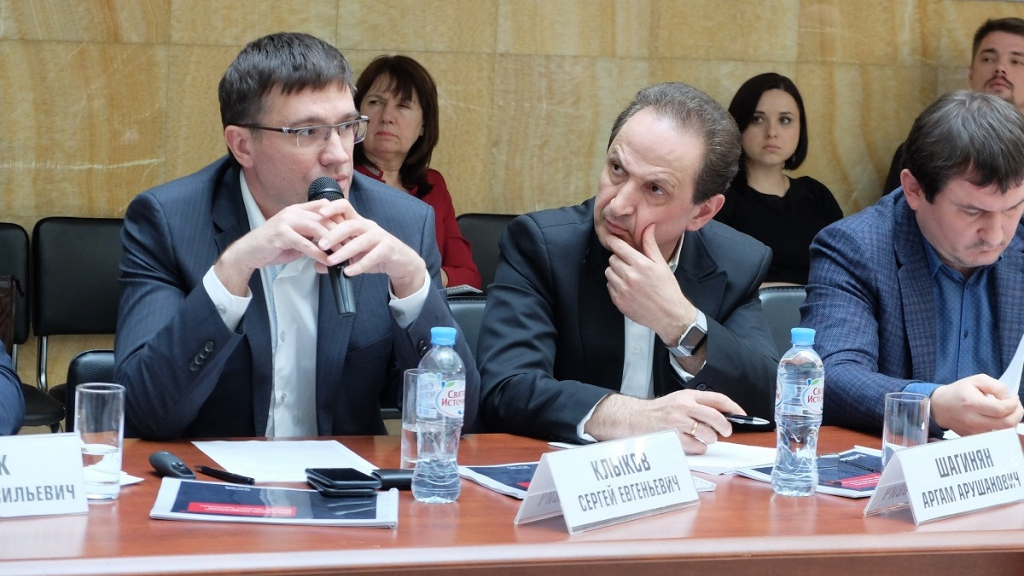Solution is consolidation
On February 20, a roundtable was held in Krasnodar concerning the integrated development of territories, where Sergey Klykov, the Director General of the Unitile Group of Companies, made an expert assessment of the situation.

Recently, the economy and a number of related processes are increasingly testing builders for strength. The number of challenges faced by market participants, although not growing in geometric progression, is certainly not reducing. Here we have the fall in real incomes of the population, and the completion of the federal program for subsidizing mortgage rates, and the stringent financial requirements of new FZ-214 revision, and avoidance of fractional ownership. Besides, the administrative pressure on developers is increasing. However, one can hardly say that it has no basis. Let’s be honest, chaotic infill construction, without roads and elementary social infrastructure, sometimes without taking into account the master plan, has become a real problem for the vast majority of cities.
— "In Soviet times, as far as the construction is concerned, all issues were solved comprehensively at the project stage", - one of the administration's representatives said. "In financing proportions, about 50% was allocated for residential construction, 25% - for the social support facilities, and another 25% was allotted for roads and utilities." That's why the cities didn't face so many problems that have to be resolved today. For example, traffic standstills, which are associated not only with the increase in the number of personal transport. They are no less caused by the fact that people who got settled in a huge residential estate, built without taking into account the traffic capacity of streets and the availability of a school, a kindergarten and a polyclinic have to take their children to another district for school in the morning, and then have to go to a huge business-center for work, which is also built without regard to the transport component, the availability of sufficient number of parking areas and the like.
One must admit that his words made sense. However, builders were no less right when they didn't object to the benefits of integrated construction but turned authorities' attention to the fact that the devil was usually in details.
— “During the times you are talking about, there was a single decision-making center," - one of the developers said rather emotionally. "And when builders entered the site of the future construction, they knew that they would not have problems with connecting to gas, water or electricity networks. Today we have each of these resources assigned to a separate monopolist, who imposes any conditions he wants, who justifies the rates, apparently inflated, based on the "I want so" principle. And all of this, just for a minute, the cost of the square meter.
— "I can build a school, a hospital, anything," - another discussion participant supported him. "But where do I get the money for it from? Should I include everything into the cost of a square meter the colleague has already mentioned of? Moreover, at the moment I have the money to build two or three houses, but the comprehensive construction development assumes a much larger number of houses."
In short, the debates turned out to be intensive, although, it should be noted that the parties tried to listen to each other and to respond to each other in the most constructive fashion and were to the point.
— "It's very good that we have gathered in one place and can discuss our problems," - Sergey Klykov remarked in his speech. "Everything that is said here relates to us very much. The producers of building materials depend on the developers, if not by a hundred percent, by to a very large extent. In my opinion, everything that is being said here by the parties involved in this dialogue shows that the entire industry in the broad sense of the word, and not only the developers, needs maximum consolidation. In the past, this function was performed by the State Planning Committee, regional and city committees. The projects were typical. Now they are no longer so.
This means that we should create expert and project forums ourselves - on the basis of building associations and address any issue in a comprehensive manner. There are areas for development, which are too large for one developer. There are public opportunities for financing the social and transport infrastructure, the public authorities spoke of. There are problems with monopolists, which cannot be solved alone, and "never-ending" negotiations also have their implications.
If desired, it is possible to unite and create a single, not typical (people today do not really want impersonal housing), namely a comprehensive project involving several developers, a project with unified logistics, with a clear program and tasks for related parties. For example, today we are ready to make products according to a specific order. This, among other things, allows reducing the cost of the notorious square meter.
We are already implementing a project with a large federal developer who has refused using clinker for finishing and replaced it with so-called “Metro” tiles similar to it. A few more interesting projects are at the stage of final negotiations.
We are always ready to make concessions for you and want you to contact us as often as possible with your needs and wishes. Believe me, at least in our industry, technology opportunities have reached such a level that we can do almost everything."
